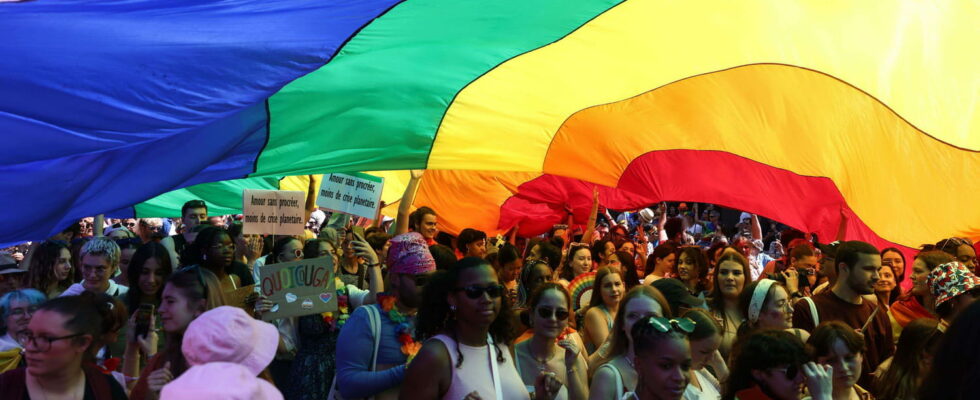The Pride or Pride March 2024 will be held this Saturday, June 29 and will set off in the streets of Paris from 1:30 p.m. Discover the stages of the parade and the concerts organized at Place de la République.
Paris Pride will leave this Saturday, June 29, 2024 at 1:30 p.m. from Porte de la Villette, on the eve of the first round of the early legislative elections, the opportunity to demonstrate “against transphobia, and for transsolidarity, in France, in Europe, throughout the world” according to Inter-LGBT, organizer of the event, but also to “march on the extreme right” to the gates of power, which could regress LGBTQIA+ rights. In a column published in Stubbornthe French LGBT+ magazine calls for “an unparalleled mobilization against the far right and its complacent friends on June 29, 2024, at the Paris and Île-de-France Pride Marches. France, eve of the vote in the first round of the legislative elections.
The walkers who will carry the colors of the community high will set off on a 4 kilometer route towards Place de la République, passing through Avenue de Flandre and Boulevard de Magenta. On the Place de la République, a large podium is planned from 5 p.m. to 10 p.m. with numerous speeches and concerts by Eddy de Pretto, Bilal Hassani, Piche and Louïz. Did you know that the very first demonstration, “Gay Pride”, took place in 1981? Discover the route in detail, the concerts offered and the history of the Pride March below.
The procession of the Pride March or Parisian Pride 2024 takes place from 12:30 p.m. at Porte de la Villette, Corentin Cariou metro station to reach Place de la République in Paris at 5 p.m. A podium will be installed there for a big festive and protest arrival. Here are the stages of the route:
- 12:30 p.m.: meeting at Porte de la Villette, Corentin Cariou metro station
- 1 p.m.: speeches
- 1:30 p.m.: start of the walk from Porte de la Villette
- 5 p.m.: arrival at Place de la République and start of the podium
- 10 p.m.: end of podium
The Pride parade ends at 5 p.m. on Place de la République with a free concert during the Grand Podium of the Pride March which has many surprises in store from 4:30 p.m. Among the guest artists: Eddy de Pretto, Bilal Hassani, Desire, Piche, Vénus Noire, Dyke Menopause or Louïz… The party will end around 10 p.m. at République.
It was in June 1969, after a violent police raid on the Stonewall Inn, a legendary gay bar in New York, that the first parade of lesbian, gay, bisexual and transgender was organized across the Atlantic. These demonstrations, which then turned into riots for several days, mark the beginning of the fight for equal LGBT rights. Gay pride will soon be born from this violence with, the following year, a parade in the streets of the city organized by Brenda Howard, a bisexual considered today as a pioneer of this fight. Other parades under the sign of “pride” will take place at the same time in Los Angeles or San Francisco, then, a few years later, in Europe, starting with Germany.
Gay Pride will arrive in 1981 in Paris. This free and accessible event will gradually bring together more than half a million people in the capital. And she has come a long way, in France too. According to an Ifop survey published last year, 83% of French people now believe that the Pride Marches have contributed to advancing rights for LGBT people. Since then, it is not one Pride March, but dozens which are organized throughout France throughout the month of June, bringing together tens of thousands of people.
